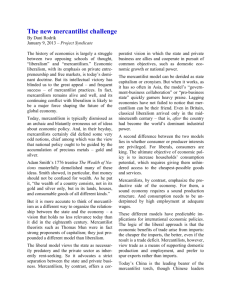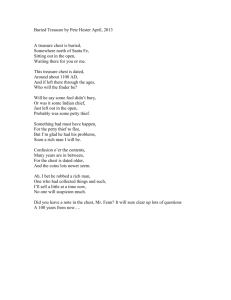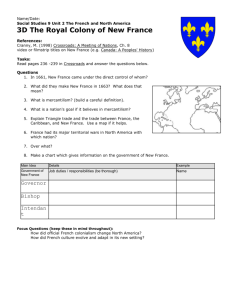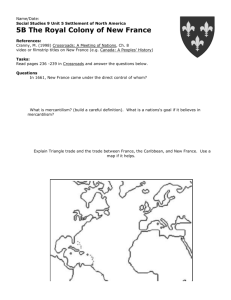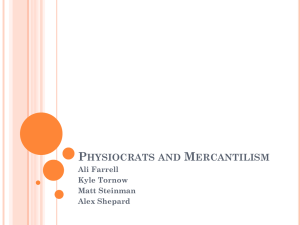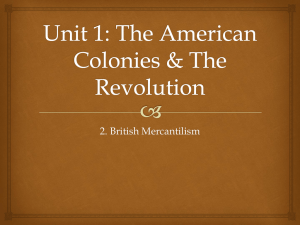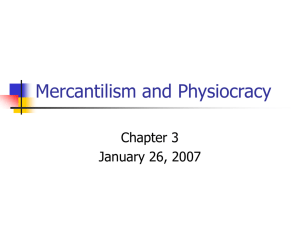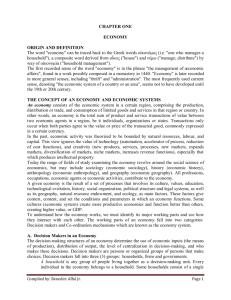Pre-Classical Economics
advertisement
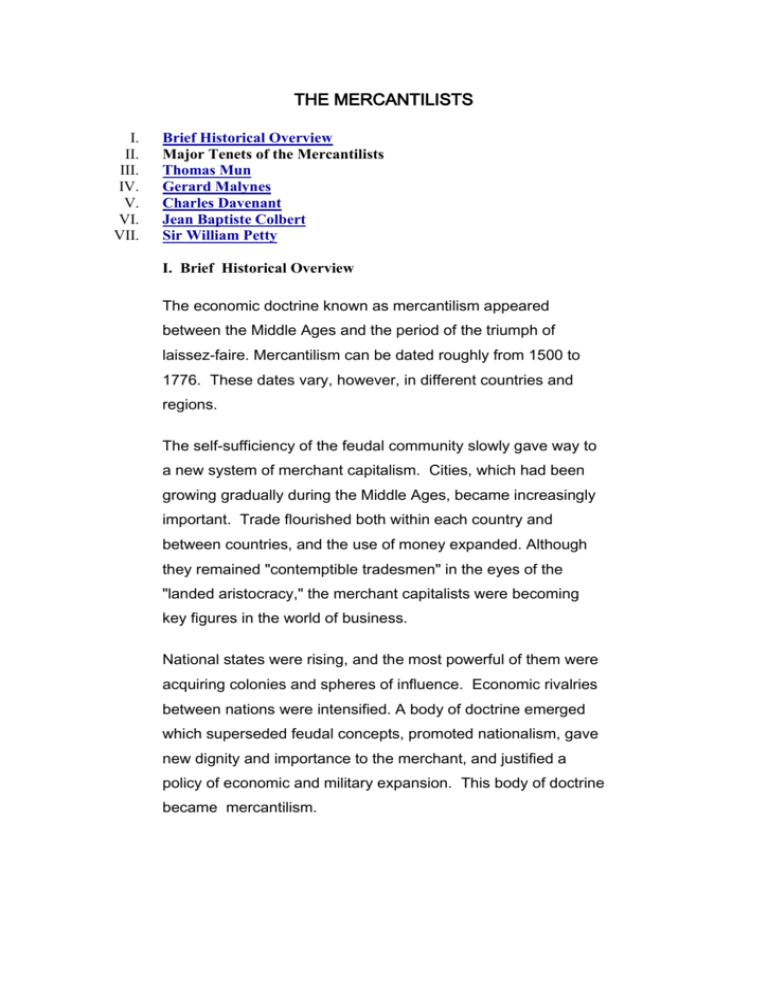
THE MERCANTILISTS I. II. III. IV. V. VI. VII. Brief Historical Overview Major Tenets of the Mercantilists Thomas Mun Gerard Malynes Charles Davenant Jean Baptiste Colbert Sir William Petty I. Brief Historical Overview The economic doctrine known as mercantilism appeared between the Middle Ages and the period of the triumph of laissez-faire. Mercantilism can be dated roughly from 1500 to 1776. These dates vary, however, in different countries and regions. The self-sufficiency of the feudal community slowly gave way to a new system of merchant capitalism. Cities, which had been growing gradually during the Middle Ages, became increasingly important. Trade flourished both within each country and between countries, and the use of money expanded. Although they remained "contemptible tradesmen" in the eyes of the "landed aristocracy," the merchant capitalists were becoming key figures in the world of business. National states were rising, and the most powerful of them were acquiring colonies and spheres of influence. Economic rivalries between nations were intensified. A body of doctrine emerged which superseded feudal concepts, promoted nationalism, gave new dignity and importance to the merchant, and justified a policy of economic and military expansion. This body of doctrine became mercantilism. II. Major Tenets of Mercantilism 1. Gold and silver is the most desirable form of wealth. 2. Nationalism. For the mercantilists economic allocation is a "zero sum game." The French essayist Michel de Montaigne who wrote in 1580; "The profit of one man is the damage of another.... No profit whatever can possibly be made but at the expense of another." The same idea was extended to countries. One country gains only at the expense of another country. 3. Duty free importation of raw materials that could not be produced at home, protection for manufactured goods and raw materials that could be produced domestically, and export restrictions on raw materials. The interests of the merchant took precedence over those of the domestic consumer. 4. Colonization and monopolization of colonial trade. Example of this policy: The English Navigation Acts of 1651 and 1660: - Certain colonial products had to be sold only to England. - Foreign imports into the colonies were restricted. - Colonial manufacturing was curbed or outlawed. 5. Opposition to internal tolls, taxes, and other restrictions on the movement of goods. Tolls and taxes could throttle business enterprise and drive up the price of a country's exports. However, mercantilists did not oppose monopoly grants and exclusive trading privileges. 6. Strong central government. A Strong central government was needed to: - grant privileges to companies engaged in foreign trade. - promote agriculture, mining, and industry with subsidies and protect them from imports via tariffs. - set standards of quality in production to maintain reputation in foreign markets. 7. Importance of a large, hard-working population. Why? - for the military - to keep wages low Why keep wages low? - low export prices - reduce idleness IV. Thomas Mun (1571-1641) Thomas Mun was born into a merchant family and became well known and wealthy as a merchant dealing in international trade. He was a director of the East India Company. The East India Company was criticized for exporting gold. In 1621 Mun published, in defense of this practice: Englands Treasure by Forraign Trade, or The Ballance of our Forraign Trade is The Rule of our Treasure which Schumpeter says "is generally looked upon as the classic of English 'mercantilism.' and remarks "This prominence is unfortunate, but it is not wholly unmerited." Englands Treasure by Forraign Trade, or The Ballance of our Forraign Trade is The Rule of our Treasure A Few Excerpts Chapter II "The Means to enrich this Kingdom, and to encrease our Treasure. Although a Kingdom may be enriched by gifts received, or by purchase taken from some other Nations, yet these are things uncertaim and of small consideration when they happen. The ordinary means therefore to encrease our wealth and treasure is by Forraign Trade, wherein wee must ever observe this rule; to sell more to strangers yearly than wee consume of theirs in value." V. Gerard Malynes ( ? - 1641) Gerard Malynes, born in Belgium of English parents, was a merchant of limited success. He served as the English commissioner of trade in Belgium and held other positions in the English government. In 1622 he published The Ancient Law-Merchant , which contained put forth many mercantilist ideas. Malynes had a conception of the role of money in the determination of prices From The Ancient Law-Merchant: "Plenty of Mony maketh generally all things dear, and scarcity of Mony maketh generally things good cheap." and had a relatively advanced concept of the interaction of international exchanges, price levels and gold and silver flows, which form that basis for the "specie-flow mechanism" analysis. From Schumpeter, Book II, Chapter 7, 3. Exchange Control, "… during the whole of that century, no other writer surpassed him in clear and full understanding of the international mechanism of foreign exchanges… In the Second Part of his treatise, Canker of England's Commonwealth, he nicely explains how, if a country's currency falls below its mint par and coin flows out in sonsequence, then prices will fall in that country and rise abroad 'where our mony concurring with the monies of other countries causeth plenty, whereby the price of forreign commodities is aduanced.'… We must go to the eighteenth centruy in order to find the argument carried to the conclusion to which it points. " VI. Charles Davenant (1656 - 1714) Charles Davenant spent most of his career working for the British government and in Parliament. He was a mercantilist, but , in some writings, foreshadowed latter developments in economic thinking. He was a mercantilist: - from An Essay on the East-India Trade (1696) "For it is the Interest of all Trading Nations whatsoever, that their Home-Consumption should be little, of a Cheap and Foreign Growth, and that their own Manufactures should be sold at the highest Markets, and spend Abroad; since by what is Consum'd at Home, one loseth only what another gets, and the Nation in General is not at all Richer; but all Foreign Consumption is a clear and certain Profit." He foreshadowed latter developments in economic thinking: He considered the wealth of a country to be what it produces rather than gold or silver. Also - his concern for a surplus in the balance of trade was based on the notion that an increase in the quantity of money causes interest rates to fall. It is this "merchantilist" position that Keynes defended. VII. Jean Baptiste Colbert (1619-1683) Jean Baptiste Colbert was the French minister of finance from 1661 to 1683. He worked, with only partial success, to improve the conditions for internal trade. He improved the public infrastructure, in part by the use of the hated corvee. Imposed heavy regulation of business. Promoted a large and hardworking population. VIII. Sir William Petty (1623-1687) The son of a poor clothier, he became highly educated, wealthy and famous. "Petty was a self-made man - physician, surgeon, mathematician, theoretical engineer, a member of parliament, public servant, and businessman - one of those vital people who make a success of almost everything they they touch, even of their failures. … Marx's decree to the effect that Petty was the founder of economics added socialist applause to bourgeois eulogies initiated by Roscher in 1857." (Schumpeter) Petty supported many mercantilist ideas, but is also considered a forerunner of classical economics. Supported many mercantilist ideas: - supported tariffs on imports - favored a large population (increasing returns to gov't) - favored a poll tax to encourage the labor of children - favored slavery rather than death for thieves; force slaves to do double work " …and thereby become as two men added to the Commonwealth, and not as one taken away from it." forerunner of classical economics: - velocity of money - division of labor (essentially the same ideas as Adam Smith)
